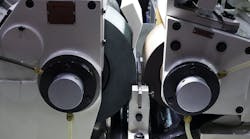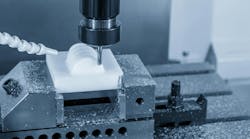The European Association of the Machine Tool Industries (CECIMO) is raising concern about its members’ declining market share, and using a new market study to argue for the importance of having manufacturers work closely with customers, to develop new capabilities and to market products and services effectively. The “Study on the Competitiveness of the European Machine Tool Industry” was presented at a round-table meeting of CECIMO members and members of the European Parliament, held last week at Strasbourg, France.
The study was prepared by a voluntary group of industrialists coordinated by CECIMO, and the group said it presents a comprehensive study of the European machine tool industry “in the post-crisis era.”
CECIMO is a consortium of 15 national associations of machine tool builders, representing approximately 1,500 industrial enterprises in the E.U., European Free Trade Assn. (EFTA), and Turkey, and covers more than 97% of total machine tool production in Europe and more than 33% worldwide.
The Strasbourg event was titled: “Made in Europe? Challenges facing the EU’s machine tool industry.” CECIMO said the results of its study reveal that the share of European machine tool production has been in decline over the last decade, largely because of the industrial shift to Asian markets.
“Driven by the rise of China, Asia has become truly ‘the factory of the world’ over the past decade,” stated CECIMO vice president Michael Hauser. “Today, Asia consumes more 66% of the world’s machine tool production and China alone absorbs 50% of this. The share of European consumption in world consumption has dropped from 40% to one-fifth (20%) over the last decade, the share which was obviously lost to Asia.”
Asserting the fundamental role of machine tools in industrialization, CECIMO indicated that emerging economies have increased their investments in production systems that have been supplied by the European machine tool industry to a great extent. “This is good news for our companies as their exports to China and Asia are booming,” allowed Hauser, who is CEO of Tournos S.A. in addition to his CECIMO post.
“However, the bad news is that our customers relocate outside Europe and we are forced to follow them to other markets,” he continued. “Expanding to Asian markets is almost ‘a mission impossible’ for an SME employing a hundred people,” he said. Over 80% of CECIMO’s member firms are small and medium enterprises (SMEs.) SMEs generally lack human and financial resources to expand internationally, and also lack the management skills and resources to cope with the unpredictable risks in emerging markets.
The CECIMO study emphasized the importance of having machine tool companies maintain close contact with their customer base in order to undertake “joint innovation projects” and to set up effective sales, distribution, and service channels.
CECIMO also addressed the policies of some emerging markets that distort fair trade by restricting market access, undermining intellectual property rights, and directly support domestic companies. The group said market access for European imports is restricted, and predicted that this trend will continue. Such practices risk “condemning European suppliers to a small niche market of high-end products and … risk gradually disconnecting them from customers which (sic) relocate in these markets,” CECIMO stated.
“Cutting off the ties between a machine tool builder and its customers means not only crippling sales, but also cutting off the lifeblood of innovation of that company,” according to Hauser.
“Losing the machine tool industry, a key enabling sector, would mean losing the capability of making ‘next generation products’ and building the future European economy,” CECIMO director general Filip Geerts said. “If Europe became dependent on production technology and know-how imports, this would be the final blow to European manufacturing, leading to the total de-industrialization of Europe.”
CECIMO’s study stressed the need to continue manufacturing in Europe, in order to maintain the “manufacturing know-how.” It said this effort would be “a pre-requisite to master industrial innovation and to benefit from first-mover advantages to produce fuel-efficient cars and airplanes, renewable energy generation equipment, medical equipment for an aging society, and all other value-added products in Europe.”
Geerts encouraged the EU and its member states to commit to developing and implementing a long-term, common European manufacturing strategy that is adjusted to the globalization era.
“Such a strategy should support the internationalization of SMEs by providing assistance for capacity building, information on market access, and more favorable conditions for export finances, which will allow them to expand to emerging markets and to benefit from economies of scale. Meanwhile, Europe should focus on measures to boost innovation and productivity which (sic) will enhance the competitiveness of manufacturers in the global marketplace.”





